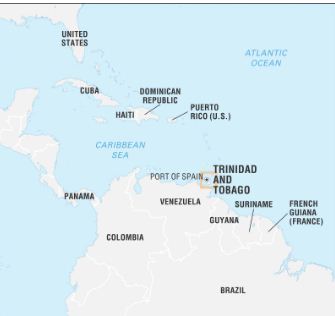January 1, 2025
Emergency in Trinidad and Tobago/ट्रिनिडाड और टोबैगो में आपातकाल:
Why in news ?Authorities in the dual island nation of Trinidad and Tobago imposed a nationwide state of emergency recently following a spate of recent killings linked to gang violence.
The move followed what a local official dubbed an “outbreak of gang violence” over the weekend that saw multiple people shot dead in public areas. Authorities believe the brazen tit-for-tat shootings are between rival gangs seeking to expand territory in the capital city, Port of Spain.

History :
Trinidad and Tobago is a twin-island country located in the Caribbean. Over the years, it has faced various political, economic, and social challenges, including periods of unrest and emergency situations.
History of Trinidad and Tobago:
- Colonial Era:
- Early Colonization: The islands were first inhabited by indigenous peoples before being colonized by European powers. Trinidad was claimed by Spain in 1498, while Tobago changed hands among several European powers before being colonized by the British in the 18th century.
- Slavery and Sugar Economy: During the colonial period, the economy was based on sugar and other agricultural products, and enslaved Africans were brought to the islands to work the plantations. Following the abolition of slavery in 1834, indentured laborers from India were brought in to work the sugar plantations.
- Post-Colonial Period:
- Independence: Trinidad and Tobago gained its independence from Britain in 1962, becoming a republic in 1976.
- Oil and Natural Gas Reserves: The discovery of oil and natural gas in the 20th century played a significant role in transforming the nation’s economy, bringing wealth but also new challenges related to the management of these resources.
Conflicts and Emergency Situations:
Trinidad and Tobago has experienced a series of political, social, and economic issues that have occasionally led to crises and emergency situations.
- 1970 Black Power Revolution:
- Context: In the late 1960s, rising social and economic inequalities, along with the influence of global civil rights movements, led to widespread discontent. The Black Power Movement, which advocated for racial equality and justice, gained significant traction.
- The 1970 Uprising: In April 1970, a group of radical youth, led by the Black Power Movement, staged protests and demonstrations. The government declared a state of emergency, and martial law was imposed. The military and police used force to suppress the unrest. While the movement did not lead to a regime change, it had a lasting impact on Trinidadian politics, drawing attention to issues of race, class, and governance.
- 1990 Coup Attempt:
- Context: In 1990, a group of radical Islamists, led by Yasin Abu Bakr, attempted to overthrow the government of Prime Minister Arthur N.R. Robinson. They seized the parliament building and took the government officials hostage.
- The Siege: The coup, known as the 1990 attempted coup or the “July 1990 insurrection,” lasted for six days. During this period, the country was plunged into a state of emergency, with widespread curfews and restrictions on movement. The military and police forces responded, and the coup attempt was ultimately foiled, but not before several people were killed, and the country was destabilized.
- Aftermath: The government regained control, and the leader of the insurgents, Abu Bakr, was arrested. However, the coup highlighted serious divisions within society, including dissatisfaction with political leadership, economic inequality, and the rising influence of radical religious groups.
- Drug Trade and Crime:
- Context: Trinidad and Tobago, due to its location near major drug-producing countries like Colombia and Venezuela, has faced ongoing challenges with drug trafficking. The drug trade has been linked to organized crime and violence, which has contributed to social instability.
- Impact on Stability: In response to rising violence and crime, the government has periodically implemented emergency measures to deal with security issues, including curfews and military interventions. The crime rate has been a major source of public concern and a driver of emergency responses.
- Economic Crises and Political Instability:
- Oil Price Volatility: Trinidad and Tobago’s economy is heavily dependent on oil and gas exports. Fluctuating global oil prices have had significant effects on the national economy, leading to periods of economic instability.
- Political Turmoil: Economic hardship has sometimes led to protests, strikes, and political unrest, especially during times of austerity or budget cuts. These have occasionally led to the declaration of a state of emergency to maintain order.
Key Factors Leading to Emergencies:
- Political and Social Inequality: Economic disparities, especially in terms of race and class, have fueled tensions and unrest, contributing to periodic emergencies.
- Crime and Drug Trafficking: Organized crime and drug trafficking are significant challenges that have led to violent outbreaks and have required emergency interventions by the government.
- Ethnic and Religious Tensions: Tensions between the Afro-Trinidadian and Indo-Trinidadian communities, as well as the influence of radical religious groups, have sometimes been a source of conflict and instability.
- Environmental and Economic Crises: External factors such as fluctuations in global oil prices, natural disasters (like hurricanes), and the challenges of managing the country’s resources have contributed to economic and social instability.
January 30, 2025
January 20, 2025
January 14, 2025
